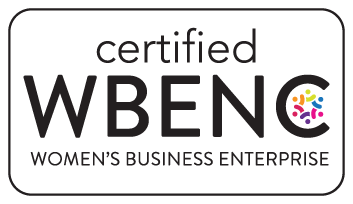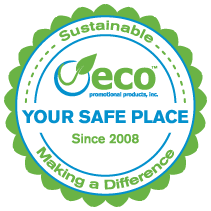Sustainable Green Meetings, a Plan of Action for Results
By: Michelle Sheldon, Eco Promotional Products, Inc.
The Meeting Industry’s impact on our environment is so substantial that just a few course corrections would make a great difference. From energy consumption and its related harmful emissions to the unfathomable waste, sustainable changes must be made.
Take responsibility and become a leader in sustainable green meeting planning and implementation. Green meetings will not only reduce the environmental impact, they will leave a positive and lasting impression on the participants, organizers, service providers and community as a whole. And they may
even cost less.
Here are tips to help make your next meeting environmentally and socially responsible:
1. Establish environmental goals. Examples: Decrease the amount of solid waste produced. Reduce the energy and water consumed. Minimize or off‐set harmful emissions from transportation and energy consumed associated with the event. Establish a recycling plan and calculate waste diverted from a landfill.
2. Create a “Green” check list for exhibitors. Identify issues that will allow exhibitors the opportunity to improve upon display, travel, shipping, handouts, promotional products, etc. Acknowledge those exhibitors who go above and beyond. Share success stories and explain how their actions made a difference. Create an eco award for exhibitors.
3. Reduce travel for attendees and speakers. Choose venues and hotels that are close to major airports. Be sure to have hotels located within walking distance to the venues. Offer rideshare programs and information on easy access to public transportation.
4. Reduce, Reuse & Recycle. Insist your meeting venues and hotels provide visible and easily accessible reduction, reuse and recycling services. “If disposable, make responsible”. Encourage zero waste products such as biodegradable and compostable sugarcane plates & PLA (corn based) cold cups and biodegradable cutlery. Replace landfill destined water cups and individual bottled water with water stations and compostable cups or reusable drinkware. Encourage the use of reusable BPA free drinkware such as stainless steel water bottles or USA made recycled eco water bottles.
5. Reduce or eliminate small individual consumption products. Food and beverage service providers often have access to bulk dispensers for cream/milk for coffee, sugar, salt, pepper and other condiments. Explore composting as an option.
6. Be responsible with your promotional products. Make sure to choose items that are useful, reusable and reduce the use of non‐rapidly renewable resources. Stay away from gimmicky items that will end up in a landfill. Consider “tools” to encourage energy and water conservation. Examples include the USA made eco thermo-strip, recycled 5‐minute shower timer and USA made recycled magnets featuring your company’s logo and information along with environmental tips.
7. Choose a hotel in tune with sustainability. It’s now common for hotels to allow guest to choose not to change towels and sheets daily. Some hotels have low flow toilets, use ENERGY STAR compliant electronics, and clean with green certified products. There are now selections of Green Seal Certified Hotels. When booking your hotel find out their sustainability policy and procedures. See how they may help you to behave in a more sustainable way.
8. Choose local, healthy and even organic food choices. Check with the local catering to see if they can utilize locally grown seasonal produce. Make sure food is fresh and provide vegetarian meal choices along with non‐vegetarian.
9. Be responsible regarding printed materials. Instead of printed materials, follow up with electronic transfer of documents or put materials onto flash drives. There are now great bamboo USB flash drives, USB's made from recycled shoes and credit card USB’s made with recycled plastic bottles. Make sure they are RoHS compliant (Restriction of Hazardous Substances for electronic and electrical goods.) meaning lead free. If printing, print on both sides of at least 30% post consumer waste recycled paper.
10. Save energy. Coordinate with management to make sure lights are turned off when a room is not in use. Make sure the rooms are comfortable; however, go easy on the air conditioning. (How about recommending to the venue that they use low energy bulbs such as compact florescent or even better, LED?)
11. Brand yourself responsibly. A very useful, reusable way to promote your brand is by wearing stylish, eco friendly clothing with your organization’s logo clearly embellished on the garment. There is now, more than ever, fashionable clothing made from recycled water bottles, or rapidly renewable resources. Great choices also include certified organic cotton shirts or recycled polyester polo shirts. Work under the premise that you are the face of your organization. Why not represent your brand responsibly and in style?
12. Communicate, communicate, communicate. Highlight your green motivation before, during and after your events. Share your knowledge. Get testimonials from attendees. Publish your successes. Your efforts will become contagious. If this seems overwhelming, narrow your scope and select two or three new practices and build on their success. Develop a “greening your events” strategy. Be sure to establish a level of commitment in your organization from the top down. Successful implementation often starts from a strong commitment level and a focused plan of attack.
CIC’s (Convention Industry Council) APEX initiative, in partnership with ASTM International, has created the industry's first and only comprehensive standards for environmentally sustainable meetings.
For more smart and sustainable ways to green your next meeting, please contact Eco Promotional Products, Inc. at 877.326.9467 or visit www.ecopromotionsonline.com .
Michelle Sheldon (michelles@ecopromotionsonline.com) is president of certified woman‐owned Eco Promotional Products, Inc. (EPP) Vernon Hills, Illinois, which supplies a breadth of environmentally and socially responsible merchandise to businesses and individuals interested in sustainability and respecting our natural resources.






